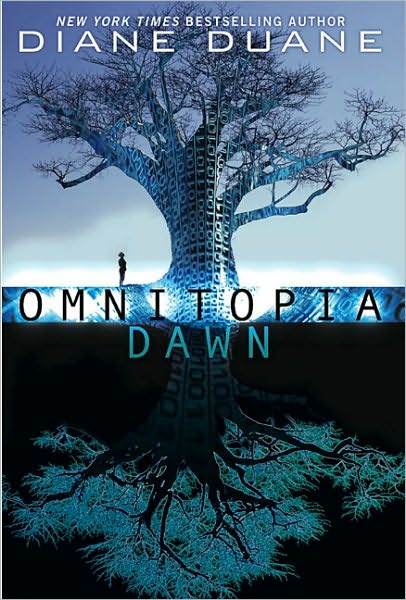For those who are familiar with the ouvre of Diane Duane, Omnitopia Dawn will seem a departure. Duane is best known for her fantasy: the Young Wizards series of children’s books and their spinoff novels about wizard cats, and the seemingly eternally incomplete Tales of the Five series, which seem to be linked to these others by way of universe.
Omnitopia Dawn is something very different—a near-future science fiction novel structured like a thriller, rather than an epic fantasy revolving around the moral judgments of human or feline wizards. I think it’s more fair to consider it as a thriller than as science fiction, actually, because while it does ask some questions about how future technologies may affect human interactions, those are not its central concerns.
The titular Omnitopia is a massively-multiplayer virtual reality gaming universe created by billionaire programmer Dev Logan and his team of geniuses. It’s a somewhat anarchic, semi-open-source continuum run in accordance with Dev’s egalitarian principles, and we join the narrative on the eve of Omnitopia’s biggest and baddest expansion rollout. Meanwhile, Dev’s former partner and current business rival Paul Sorenson intends to use this opportunity to bring Dev’s company (and not-so-incidentally, Dev) to its knees.
It’s a very straightforward plot, and in the true Duane tradition it couples a slightly too-good-to-be-true hero (and his cast of loyal friends and family) against a villain who, in the final analysis, is more pitiable than evil. This is not necessarily a weakness: Duane plays to her strengths while relocating her setting, and one thing the book does very well is showcase the Vancian breadth of her invention. Omnitopia provides just what the name promises: a utopia for everyone, many of which we get to see, some in-depth and some in-passing.
The book does suffer somewhat from its roving point of view, which gets us into the heads of everyone from Dev and Paul to their meanest dupes and allies. While the struggle for control of the future of online gaming plays out, we see a great deal from the point of view of both kings and pawns, and there were a few places where I felt that too much information (which was available to a point of view character) was withheld from the reader.
The thematic arc too is a little thin: Dev is already too perfect to need much character growth, and the book tends to settle into being a transparent allegory in which the (good, utopian) open-source autonomous collective are set against the (evil, rapacious) capitalist exploiters. The characters who are suspicious that everything about Devi is a little too perfect are never proven right, and the moment when we finally see Dev act with ruthlessness is so underplayed it doesn’t feel like he’s showing us another facet of his character. However, I admit readily that this is a false binary for which I nevertheless feel enormous sympathy, so on that level it’s comfort food, even if it’s a little uncomfortably didactic.
Omnitopia Dawn starts slowly; there’s a great deal of space devoted to bringing the reader up to speed on some fairly basic SF concepts. This is another way in which it reads more like a techno-thriller than like a science fiction novel. However, it makes up for this, and for fairly thin and formulaic characterizations—especially from Duane, who I expect to be able to sketch a rich individual in a couple of pages—through the sheer majesty of its inventiveness.
It’s a lot of fun. And it’s the first novel in a series, so it’s possible that character development that I was craving is still to come.
Elizabeth Bear is the Hugo and Sturgeon Award winning author of many books and short stories.










